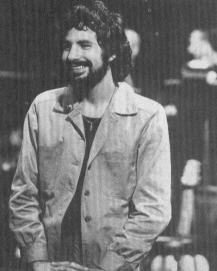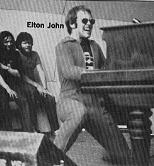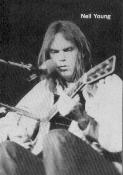- 'Buddha and the Chocolate Box'
- A Gift of Tasty Tunes
-
When Cat Stevens
put out 'Foreigner' suddenly he was on the outside looking in.Will 'Buddha and the
Chocolate Box' lure back his sweet- toothed following?
by Ellen Mandeli
Tea had just been
served, but Cat Stevens sipped at it distractedly as he waited for the hired car to take
him to Heathrow Airport, just outside London. The mysterious Mr. Moon-shadow had a lot on
his mind; in just a few hours he'd be in Glasgow for the start of a five-week tour that
would take him to four continents. It had been a long year-and-a-half since he'd last been
out on the open road, and more than seven months since he'd ventured to America to tape
his acclaimed 9Q-minute network TV special, Moon and Star, aired last November.
With his latest album,
Foreigner, Cat had tried to shock new life into a career that he was finding increasingly
boring; but although he considered it to be his most personal work, the once-faithful
following that had been enticed by the sweetly melodic muses on his earlier LPs felt
jilted, not jolted, by Foreigner. Even though it had just gone gold, his own accountant
admitted that in comparison to the three other gold discs on his wall (for Tea ~or The
Tillerman, Teaser And The Firecat, and Catch Bull At Four), Foreigner was lagging behind
in sales by thousands of records. So Cat Stevens is counting on his sixth LP, Buddha and
the Chocolate Box (on A&M) and this latest tour to get him back in touch with his
fans. Even as he added a dash more cream to his tea and gulped it nervously, the master
songwriter knew this might be his last chance to win back the highly sensitive following
he almost abandoned.
Pop prodigy: Cat Stevens,
originally known as Steve Georgiou, is a popstar poet-starkly contemplative, magnetically
attractive, radiating an intensity with every move. His first rise to fame in the late
'60s nearly killed him-the fragile teen idol wound up in a sanitarium with tuberculosis, a
collapsed lung, and a broken spirit. There he turned introspective, delving into
metaphysics and toying with the meaning of life. When he emerged years later with Mona
Bone Jakon, an unusually peaceful work, he was once again an instant success in Britain.
But Mona Bone Jakon did little more than raise a few eyebrows Stateside; Cat was mistaken
for just another singer/songwriter. His next two releases, Tea For The Tillerman and
Teaser and The Firecat, were blockbusters, though. It was hard t6 resist his gentle,
lilting tunes, lulling voice, and simple, mollifying rhythms.
The fourth Cat album, Catch
Bull At Four, marked a shocking stylistic departure. His devotees had propelled Teaser and
Tillerman way up the charts, but a fiercely driven Cat felt his style was becoming all to
predictable. Tunes like "Sitting" and "Can't Keep It In," therefore,
heralded a far more emotional presentation, a new lyrical sophistication, and a greater
complexity of musical form. Cat felt Foreigner fulfilled that promise of Catch Bull, but
his newly achieved intensity was misinterpreted by many as a stylistic self4ndulgence.
Back from alien territory:
In the drafty parlor of Cat's glistening white hideaway/home, located amidst the greyness
of one of London's toughest North End neighborhoods, the very private popstar admitted to
a British reporter during a rare interview, "I felt that Foreigner detached me from a
lot of people who generally listen to my stuff . . . I figured I'd better, come back and
show that I can still write the, stuff they want." So he hired back his long 4 time
producer Paul Samwell-Smith and his guitarist friend Alun Davis (both of whom he'd fired
in the fury of Foreigner) and, set out to recapture his former appeal.
In some respects, on Buddha
and the Chocolate Box a return to the sweet, simple style of Teaser and Tillerman is
noticeable. The songs are more straightforward. On "Oh Very Young," for
instance, soft electric piano and the soothing voice of Suzanne Lynch (the beautiful wife
of his bass player, Bruce Lynch) lighten up the libretto, which is tainted by just a touch
of sadness:.
Oh very young
'What will you leave us this time
You're only dancing on this Earth
For a short while
Complex advances: But
Buddha and the Chocolate Box is far from an artistic compromise. At a time when Cat has
been so rapidly moving ahead, (or in whichever direction he considers it), he's not about
to risk tripping himself with a giant step backwards. The songs in this collection, like
those of the fiery Greek~Englishman's other recent works, are exceedingly complex and
highly~harged with emotion.,
A medley,
"Sun/C79," begins deceivingly with a delightful bit of philosophy ("Sun is
the reason/And the world it will bloom"), but his ponderings are soon jostled by
reggae undertones ("Sit you down/Sit you down young gentlemen"). The melody is
ultimately cut into by some forceful rock and roll and thoughts about life on the road
("She was in C79/I was a pop-star then/And having a good time"). Two other
unpredictable cuts, the lush "King Of Trees" and the pathos-filled "A Bad
Penny," were introduced on television on Moon and Star.
Jealous muse: The lyrics to
"Home In The Sky," Cat revealed, were partly inspired by the story of the
Japanese goddess Benton, the goddess of music and art. A most jealous deity, it is said
that when her worshipers share their love for her with love for an earthly being, she
steals away their talent. To Benton, creative souls must be true.
 Music is a lady
That I still love
Cause she gives me the air
that I breath.
Music is a lady
That I still need
Cause she brings me the food
That I eat. Music is a lady
That I still love
Cause she gives me the air
that I breath.
Music is a lady
That I still need
Cause she brings me the food
That I eat.
Cat, whose numerous but
fleeting affairs have earned him a reputation as a bon vivant, explained, "I've
realized that I can't have a dual relationship between my music and a lady that I love. I
can't split myself like that. I brought them together in that song."
Strong-willed enigma: If
Cat's dedication to his music is the single stable element to be found in his career, then
his inconsistency in stylistic direction is an enigma still to be reckoned with. At a time
when fans are clamoring to hear the style of the old Cat, and particularly when he himself
has conceded that he knows exactly what his fans want, why does he continue to plunge
headlong into the musical depths of the decidedly unfavored style? And why, if he has
chosen a new stance, has he included just enough of the old-style flavoring to leave most
listeners drooling like kittens kept from a bowl of cat-chow?
"I knew people wanted
to hear that kind of stuff again and I' wasn't scared about doing it again at all . . .
But I'm not going to do it all the time," was the ornery Cat's only reply as he
puffed heartily on a Dunhill cigarette. "Having a constant sound like Glen Campbell
or someone bores me silly, so it's good to have changes . . . Maybe that's why I put out
Foreigner, to have a break from the predictable. It's mysterious, and I like
mysteries."
Buddha and the Chocolate
Box Is one more musical mystery that the strongwilled Mr. Stevens' fans-the very fans
who've put him where he is -will have to contend with. It's the closest thing he's
released to his former style in almost two years, yet it exists in a totally different
realm. Whether he will be successful there or not is something that only his fans can
decide.
- And though your dreams may toss
- And turn you now..
- They will vanish away
Like your daddy's best jeans blue
fading up to the sky.


Cat Stevens: " Ghost Town" on his new album was influenced by both Elton John
and Neil Young , says Cat. |